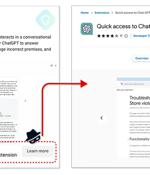Security News

While trends in phishing frequently evolve, Facebook and Microsoft's collective dominance as the most spoofed brands continues, according to Vade. Facebook and Microsoft's collective dominance as the most spoofed brands continued into H1 2023, with the former accounting for 18% of all phishing URLs and the latter accounting for 15%. Microsoft experienced increase in spoofing attempts.

New Jersey cops must apply for a wiretap order - not just a warrant - for near-continual snooping on suspects' Facebook accounts, according to a unanimous ruling by that US state's Supreme Court. "We also find that the nearly contemporaneous acquisition of electronic communications here is the functional equivalent of wiretap surveillance and is therefore entitled to greater constitutional protection."

Facebook discovered a new information-stealing malware distributed on Meta called 'NodeStealer,' allowing threat actors to steal browser cookies to hijack accounts on the platform, as well as Gmail and Outlook accounts. As Facebook's security team explains in a new blog post, it identified NodeStealer early in its distribution campaign, only two weeks after its initial deployment.

Google has stepped in to remove a bogus Chrome browser extension from the official Web Store that masqueraded as OpenAI's ChatGPT service to harvest Facebook session cookies and hijack the accounts. The "ChatGPT For Google" extension, a trojanized version of a legitimate open source browser add-on, attracted over 9,000 installations since March 14, 2023, prior to its removal.

A new Chrome extension promising to augment users' Google searches with ChatGPT also leads to hijacked Facebook accounts, Guardio Labs researchers have found. In this case, when searching for ChatGPT via Google Search, users are served with a malicious sponsored ad that first redirects them to a fake ChatGPT for Google landing page, and then to the malicious extension on the official Chrome Store.

Google has removed a ChatGPT extension from the Chrome store that steals Facebook session cookies - but not before more than 9,000 users installed the account-compromising bot. The malicious extension - Chat GPT For Google - is very similar in name and code to the real ChatGPT For Google extension.

A trojanized version of the legitimate ChatGPT extension for Chrome is gaining popularity on the Chrome Web Store, accumulating over 9,000 downloads while stealing Facebook accounts. The extension is a copy of the legitimate popular add-on for Chrome named "ChatGPT for Google" that offers ChatGPT integration on search results.

Remember the Who Targets Me browser extension from privacy activists at Noyb? The group yesterday filed explosive complaints based on log records from the extension that claim six of Germany's political parties broke European data law when they targeted voters on Facebook's adtech platform. The group is claiming the allegedly GDPR-busting activity took place during the country's 2021 federal elections, and filed six complaints yesterday with the Berlin and Bavarian data protection watchdogs against parties spanning the entire German political spectrum.

Morphisec, a security solution provider based in Israel, has reported that an advanced information stealer malware dubbed SYS01 is aimed at stealing access to Facebook business accounts and Chromium-based browsers' credentials. Morphisec's researcher has also seen the SYS01 malware attack critical government infrastructure employees, manufacturing companies and other industries.

A fake ChatGPT-branded Chrome browser extension has been found to come with capabilities to hijack Facebook accounts and create rogue admin accounts, highlighting one of the different methods cyber criminals are using to distribute malware. "By hijacking high-profile Facebook business accounts, the threat actor creates an elite army of Facebook bots and a malicious paid media apparatus," Guardio Labs researcher Nati Tal said in a technical report.